Ep. 46 - Awakening from the Meaning Crisis - Conclusion and the Prophets of the Meaning Crisis
(Sectioning and transcripts made by MeaningCrisis.co)
A Kind Donation
Transcript
Welcome back to Awakening for the Meaning Crisis.
So last time, I attempted to draw together all of the other theories, and I don't mean just the psychological theories, although they're most salient right now, but also the philosophical theories into an account of wisdom. I presented a model to you, a theory of a wisdom developed by myself and Leo Ferraro from 2013, in which we are enhancing inferential processing through active open-mindedness enhancing insightful processing through mindfulness. We're enhancing the capacity for internalization by internalizing the sage and cultivating sophrosyne. Our salience landscape naturally organizes away from self-deception and tempts us towards the truth. What's true, good, and perhaps beautiful. That's perhaps a better way of putting it. And that that coordinates the propositional knowing associated with inference, the procedural knowing associated with insight, the perspectival knowing associated with internalization together. And that, as I said, that is directed towards realizing sophrosyne. And that that can help cultivate a more moral existence, the connection to virtue. Mastery in the sense of coping and caring and meaning in life. But of course, one of the criticisms I made was that the notion of meaning in life there was too simplistic and it needs to be integrated, with a much more developed account that's already in the literature and I'm contributing to that by work I'm doing with others on meaning in life.
I pointed out that the Vervaeke and Ferraro model is missing participatory knowing. It's missing the relationship between, or at least I think it misrepresents, misaligns the relationship between the kinds of knowing. Understanding is missing. Transformational experience is—transformative experience is missing. Aspiration is missing. Gnosis is missing. So all of these things need to be deeply integrated together.
I tried to give you an account of what I think—sorry, that's too, that's too grandiose. I tried to suggest the beginnings of an account of how we turn basic understanding, which is to grasp the relevance of our knowledge into profound understanding by integrating the account of understanding with the account of plausibility. So that profound understanding is the generation of plausibility by having convergence onto a contextually sensitive optimal grip that is transformatively transferable in a highly effective manner in problem finding and many different problem finding formulating and solving in many different domains.
I also brought out the idea that in addition to inspiration, this is a term I'm giving for sudden, more sudden insight-laden transformative experience. You can have as what Callard calls, aspiration. It's more incremental. It's still can't be solved in an inferential decision theoretic fashion. She agrees with Paul on that. She does argue though, and I agree with this argument, that aspiration must be considered a form of rationality, which he calls proleptic rationality, because you're going to get into a performative contradiction. If my aspiration for rationality and my love of wisdom are not themselves rational processes, I'm kind of in trouble in my model of rationality.
Then, given all of that philosophy, what's missing as I argued is an extensive psychology of aspiration. I know one of my colleagues, Jeunsung Kim is working on exactly that problem and he's, of course, doing it in connection with a psychology of wisdom. I did suggest to you that we could see one of Callard's ideas of how we do this by we create something that's double-faced. I argued, ultimately, symbolic. Having aspects of gnosis in it that allows us to make the jump, the leap, even if it's an incremental one from who we are now and what we value now to the place where I've acquired some new thing that I value for its own sake.We use the example of music appreciation, et cetera.
But unlike Callard, I see that as inherently relying on our symbolic capacity, our capacity for enacted symbolic behavior. What I call gnosis serious play. And because I mean in serious play, it's always like when I'm playing with something, I'm treating it as, for example, a sword, but it's actually a piece of plastic. That kind of serious play that symbolic ability, especially the inactive one that gives me anagoge and analogia. That's really important, I would also argue, for aspiration. At least for the placeholders that do important work within aspiration.
I also argued that aspiration also probably has an affective component to it. And I suggested that wonder—and we saw how central wonder is to the cultivation of wisdom—that wonder is the affective state that's most conducive to aspirational progress because of the way it opens up our identity and our world triggers the transjective relationship and puts it into—that participatory knowing puts it into a developmental trajectory.
So all of that needs to be integrated together into an account of wisdom. And then I suggested to you drawing it all together is that wisdom is an ecology of psychotechnologies slash cognitive styles. That dynamic—and that means, reciprocal optimization that dynamically enhances the relevance realization that's central to inference, to insight and intuition to internalizing, especially internalizing the sage, to understanding gnosis and related to gnosis to the relevance realization at work within transformative experience and aspiration.
And then I already noted to you that that enhancement, that way in which I'm talking about wisdom, that dynamic system, that ecology is already overlapping and as it should. As it should. It is overlapping with the account we gave of enlightenment where enlighten—a crucial element of enlightenment was to create a counteractive dynamical system that counteracts parasitic processing. And I'm showing you that I think of wisdom. I'm arguing that wisdom is a kind of dynamical system that is counteractive for overcoming self-deception and therefore would be counteractive for overcoming parasitic processing and foolishness. This is a processing account.
You can see, I think, given what I've just said, how it would ameliorate foolishness, we've already talked about how it might enhance flourishing by—and we did that in connection with Sternberg, how it's going to help you be better connected to yourself, to other people and to the world. But I would argue that, especially where it's overlapping with enlightenment, that what wisdom is doing in order to enhance meaning in life is it's enhancing religio.
So we've got wisdom here, right? (Fig 1a) (draws an oval and writes Wisdom inside) And I'm sort of saying there's a significant overlap with enlightenment (draws an oval overlapping the first oval and writes Enlightenment). And one of the things that wisdom is doing that's also really important is it's enhancing religio (writes Religio below Wisdom). That's a way in which you can powerfully—and we saw already the connection. Remember Ardelt? The connection to agape, it's enhancing religio. And I would say that the enhancement of religio is already—and remember the role of wonder, potentially even awe here? It's taking us into sacredness (writes Sacredness below Religio), the notion of sacredness that I already have argued and articulated for.

Fig. 1a
And so given this connection, right? So this is how it's enhancing meaning in life (Fig. 1b) (draws an arrow from Religio and writes Meaning in life beside Religio). And of course, this is also an enhancement (draws a double-headed arrow from Meaning in life to Sacredness). These are all connected is what I'm saying. It's enhancing sacredness. I think it's plausible therefore to argue not to conclude decisively, but to argue that I've shown, I've explicated and explained the deep connections between wisdom, enlightenment, the enhancement of religio and thereby the relationship to sacredness (erases the board).
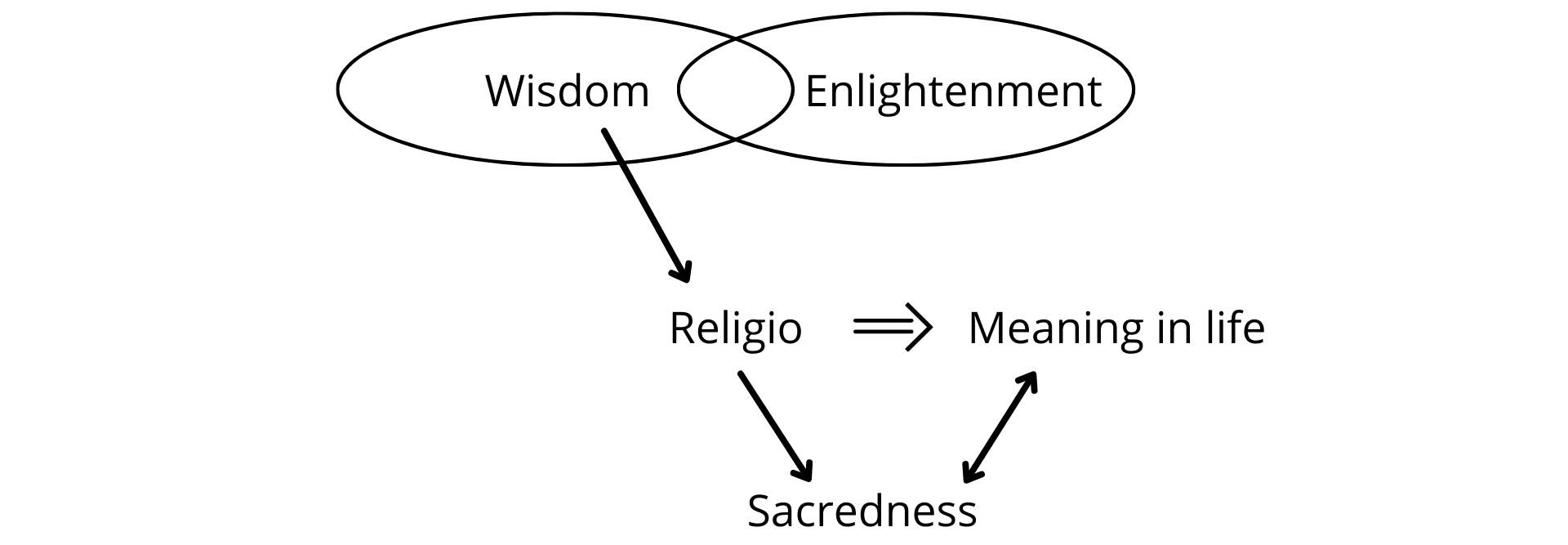
Fig. 1b
Wise Cultivation Of Enlightenment
I want to draw that all together in this notion of the wise cultivation of enlightenment (writes W.C.E). The wise cultivation of enlightenment. What that carries with it, of course, the enhancement of religio, the encountering with the sacred, the enhancement of meaning in life, et cetera. The wise cultivation of enlightenment.
I think if the wise cultivation of enlightenment is situated within two things... If it's situated within a worldview that affords worldview attunement (Fig. 2a) (draws an arrow from W.C.E. and writes Worldview), if it's situated within a worldview—and I've tried to do that by throughout consistently, I believe, at least, making this account consistent with a scientific worldview by running it all off the machinery of relevance realization that can ultimately be given a naturalistic explanation. So and we've already argued how 4E cognitive science, third-generation cognitive science can give us this worldview. And notice how much the discussion of wisdom was invoking a lot of the theoretical machinery that we got from third-generation 4E cognitive science was all through it.

Fig. 2a
Okay. So that (indicates W.C.E) is situated into a, basically an enabling and encouraging worldview. And it is also situated within some of the things I suggested where we have a co-op network of communities of practice (Fig. 2b) (writes Co-op network of communities of practice). [...] I already talked about what that is and that that is in a reflective equilibrium, dynamic, ongoing one with a wisdom Wiki (draws an arrow from Co-op network and another pointing to Co-op network, writes Wisdom wiki). And this has both a top-down like there's researchers (writes Researchers below Wisdom wiki), the researchers in wisdom that I've talked about here and then drawn from here, of course, is we want to talk about the practitioners (draws an arrow from the Co-op network of communities of practice and writes Practitioners). People are practicing.
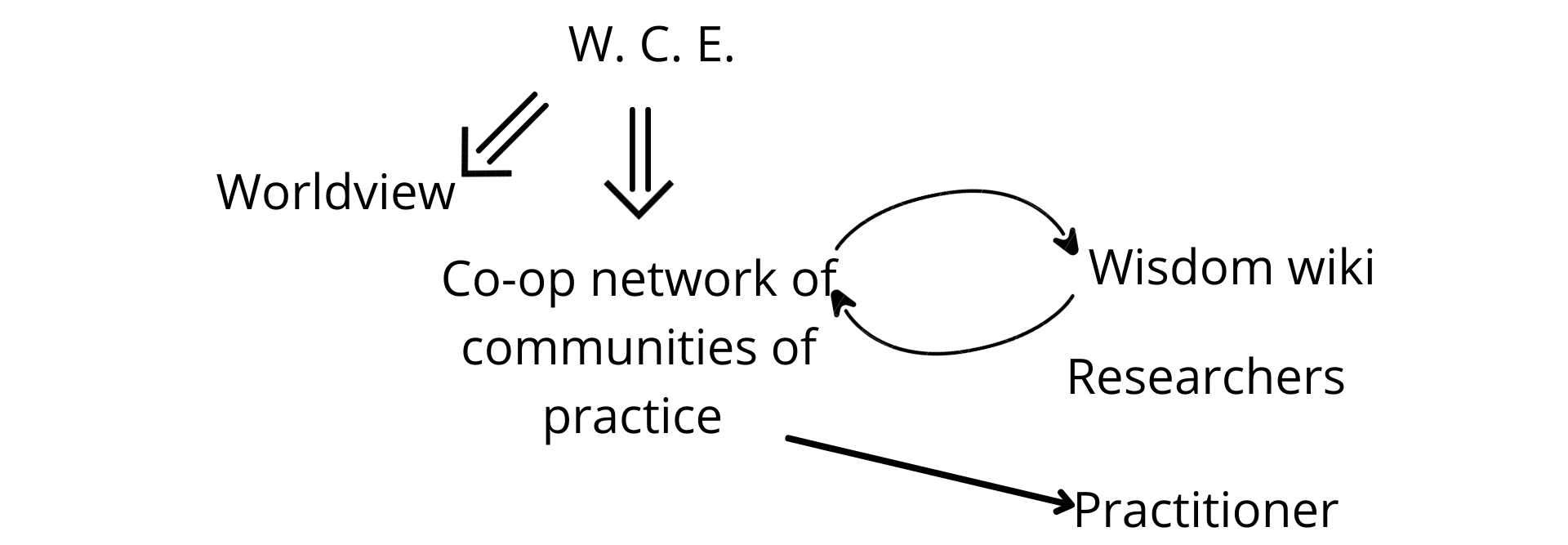
Fig. 2b
And of course, this is a bottom-up top-down relationship (Fig. 2c) (draws a double-headed arrow between Researchers and Practitioners). So (erases the arrow between Co-op network to Practitioners) we have the practitioners, we have the researchers, top-down, bottom-up relationship, and they are in that fashion contributing to the wisdom wiki (draws an arrow pointing to Wisdom wiki). The wisdom wiki is acting—it's taking on a credo function, right? But it's always in service of religio and therefore it's being created in a large part by these communities of practice.
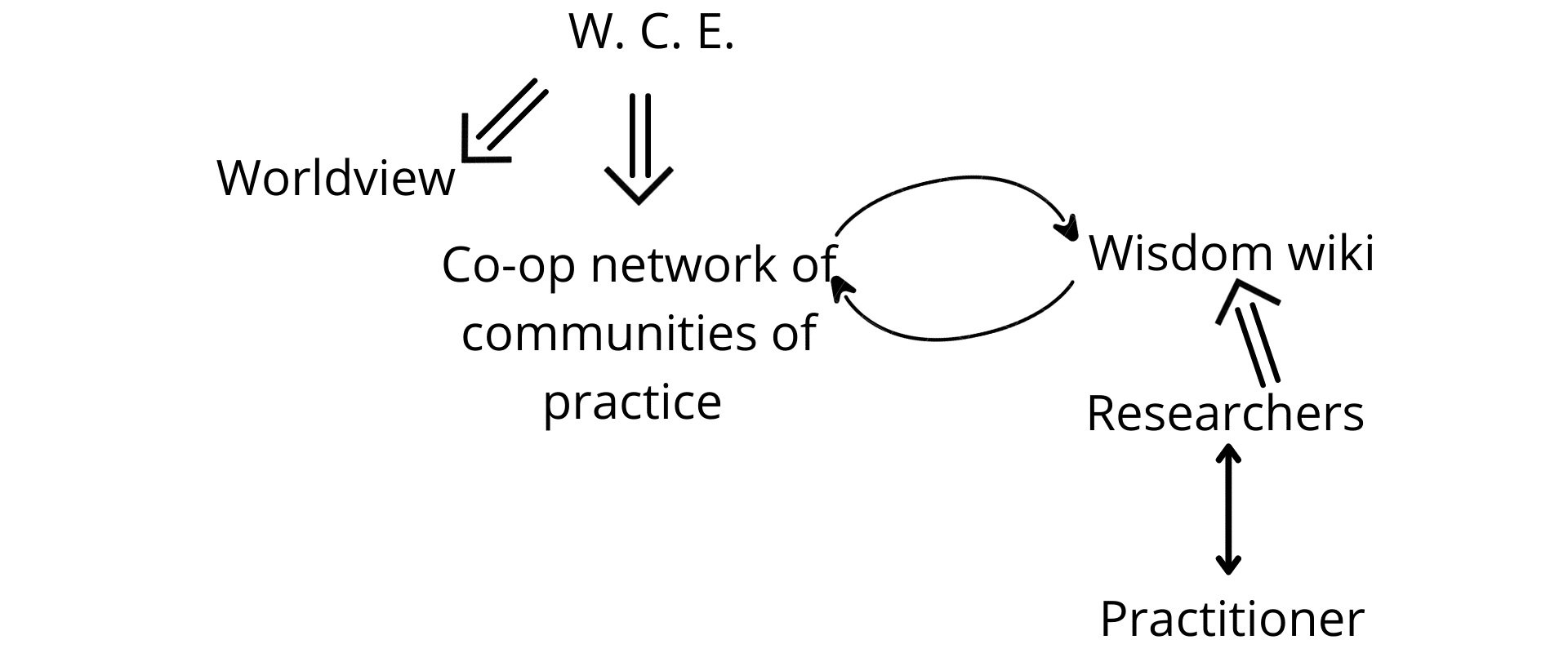
Fig. 2c
Now I think if you put this all together... here it is! This is how I think we can awaken from the meaning crisis. I think that we can draw all of the machinery together for overcoming the perennial problems dealing with historical issues. How to connect wisdom and enlightenment together in a comprehensive fashion and to connect that with enhancing and meaning in life and overcoming self-deception, et cetera, all of that machinery, and then situating it within this kind of socio-cultural framework. I think that's how we can individually and collectively awaken from the meaning crisis. And why I want to one more time—and that's what's part of this (indicates Worldview)—emphasize that all of this has been explained and can be engineered from within a secular scientific worldview. It's not a view that is in any way, I think, hostile to religion. I am genuinely and sincerely respectful throughout. But it is a way that is not dependent on religion, nor is it dependent on a political ideology.
A lot of this, this part of it (indicates Co-op network) is already nascent. It's already coming into existence. We have some existing examples of this that are being developed. We can apply it. I've tried to give you an account of this (indicates W.C.E.), and I've tried to give you an account (indicates Worldview) of how the cognitive science really situates us within a scientific worldview.
Roadmap Of Central Prophets Of The Meaning Crisis
What I now want to do is to put this into, I hope, a constructive dialogue with other responders to the meaning crisis, I would even call them prophets in the Old Testament sense of people that were telling forth the meaning crisis, trying to awaken us to it and trying to galvanize us in response to it.
So what I want to do is take everything that I've done. It's summarized by this schema (indicates Fig. 2c), right? I hope it's not oversimplified by the schema. It's summarized. And I want to put this into dialogue. I hope like I said, constructive dialogue with some of the central prophets of the meaning crisis, especially in the 20th and 21st century.
Now, inevitably I cannot do everybody. Your favorite philosopher might not make it here. Both for lack of time and lack of expertise, I'm not going to talk for example, very much about Wittgenstein. Although I think he's important. I've taken a lot of undergraduate courses, graduate courses, read a lot of Wittgenstein. Wittgenstein has deeply influenced me the notion of cultural cognitive grammar is Wittgensteinian through and through in important ways. But trying to connect Wittgenstein to the meaning crisis is not something that I feel I have the requisite expertise.
Whitehead is a philosopher I am currently again, trying to understand. He is somebody who is wrestling very deeply with the meaning crisis and trying to come up with a way of resituating us within a scientific worldview. I've read quite a bit. I'm reading quite a bit. I'm not confident yet about that. Whitehead, of course, has been terrifically relevant to process theology in some of the new theological innovations in the 20th century. And part of that could be, I've seen, I could argue, I think many people could argue, is it a way of—that theological innovation is designed to respond to the meaning crisis.
There's other people, those are just two clear examples. But what I want to offer is instead I've chosen the people I've chosen for two reasons. I've chosen them because I think I have some relevant knowledge, relevant expertise to bring to bear. And secondly, because they form a network they're—I don't want, I don't need to present them sort of a piecemeal fashion. They have relations of contrast, connection, causal influence with each other. So there's a network of people. I want to talk about that are in a sense harbingers of the meaning crisis. But again, in that prophetic sense, they're trying to awaken us and arouse us to respond.
So what I want to do is, first of all, put up what that network is going to look like to give you an overarching roadmap of where we're going (erases the board). Overarching roadmap of where we're going. And then what I'm going to be doing throughout is presenting that material. And then as I said, trying to put it into constructive dialogue with the argument I have made.
My attempt is not to sort of say that they are all—my account is better or they're all just saying what I was saying. But what I want to show is that the account I've made can be, I can argue, that it is deeply responsive and responsible to the work of these prophets of the meaning crisis.
So the figure that it's—and he's a controversial figure. And I think it's fair to say my philosophical attitude towards him is one of ambivalence, but sort of a pivotal figure in this is Heidegger (Fig. 3a) (writes Heidegger). So I want to take a look at Heidegger. Right now, I'm not going into discussing these people. I want to draw out some important connections. We'll have to go behind Heidegger a little bit and talk about Husserl (writes Husserl) and phenomenology. That's important. Heidegger is, I would argue, also deeply influenced by sort of the gnosis (writes Gnosis) underground running through Germany, especially in the 20th century and especially, like between the Wars and that comes through, at least explicitly, you can see this in John Caputo's book on The mystical element in Heidegger's thought. This comes through the Rhineland mystic of Meister Eckhart (draws a line from Gnosis and writes Eckhart), has a huge impact on Heidegger (draws an arrow connecting Eckhard to Heidegger). So those are definitely important aspects, important influences.

Fig. 3a
Another, of course, titanically important 'cause he just influences everybody is Kant (Fig. 3b) (writes Kant and draws an arrow pointing to Heidegger) and behind Kant, of course, is Descartes (writes Descartes above Kant).

Fig. 3b
So many of these people I'm not going to talk about at length because I've already talked, but I'm trying to map this out because I'm trying to show you what I'm going to invoke and then what I'm going to discuss in order to try and draw this all together.
So another really important figure, and you've heard me mention him several times.. And he directly gets into that connection with theology, but he is one of the, I think, one of the great writers about the meaning crisis. It's, of course, Paul Tillich and his masterpiece, The Courage To Be is all about, you know, a prophetic announcement of the meaning crisis and an attempt to seriously revise, you know, theology, to take that into account. And there's also, and it's, I think both this way (indicates Gnosis and moves his hand down the diagram), and it's not clear if it's also independently, but there are Gnostic element, deeply Gnostic elements. So I'll put that in sort of a dotted line (Fig. 3c) (draws a dotted line from Gnosis to Tillich) in Tillich, Tillich famously argues that we need to get to the God beyond the God of theism, which is about a Gnostic, a statement as you could possibly make.

Fig. 3c
So Heidegger also has a lot of influence on somebody you've heard me mention, especially with ideas of transjectivity, but he (Fig. 3d) (writes Corbin) has a lot to say about symbolism and the meaning crisis, and this is Corbin. And so I'm going to have to talk a lot about Corbin, because I haven't discussed him at length, but his work is again, very pivotal in trying to respond to the meaning crisis. The work that Cheetham has done in his trilogy of books, or maybe there's four books maybe. But I've read three—well, I've read two. And I'm currently reading the third. Books on Corbin really helped to make a good case for how important it is. Many people don't know about, for example, the deep connections between somebody else that we're going to talk about. Corbin and Jung (writes Jung below Corbin). And of course, Jung is directly influenced by the Gnostics (draws an arrow from Gnosis to Jung) and directly influenced by Kant (draws an arrow from Kant to Jung).
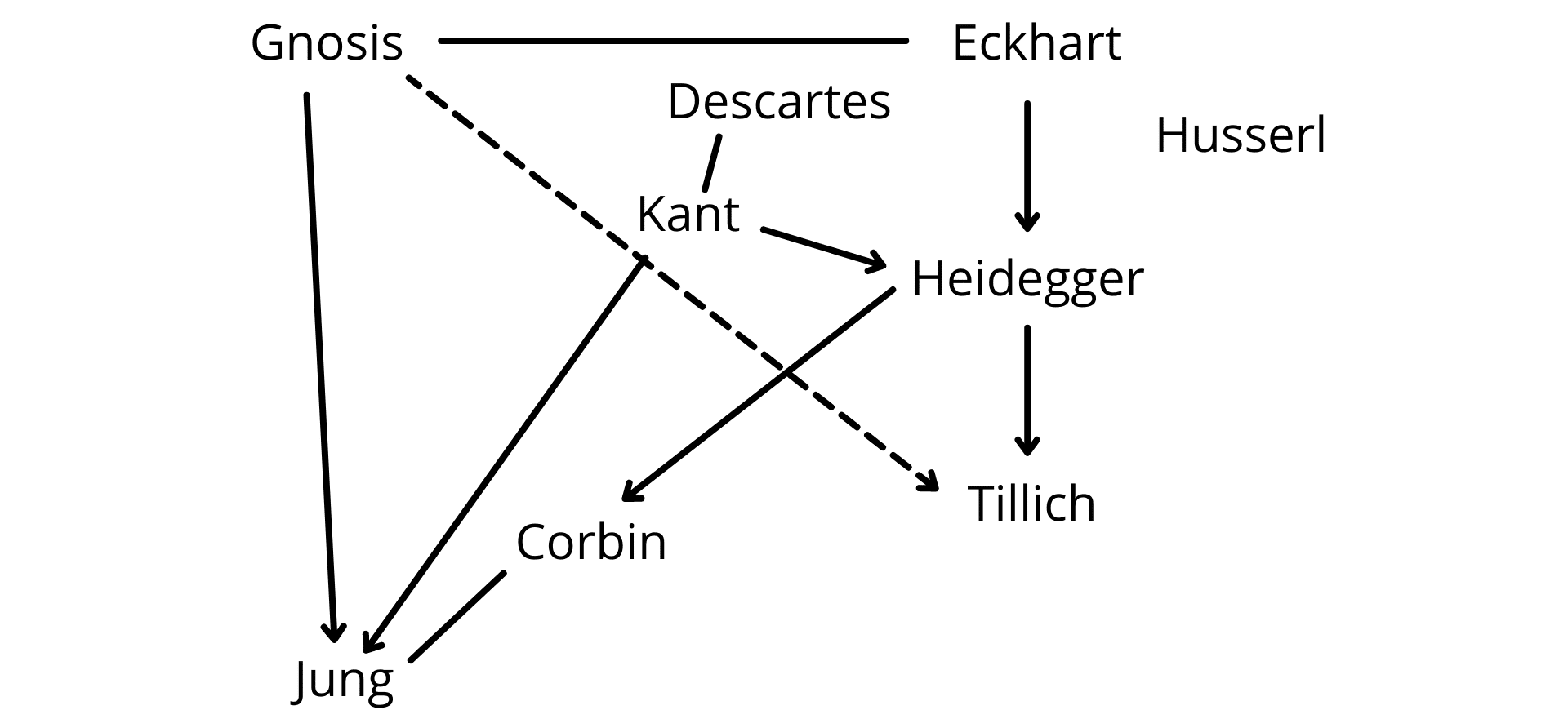
Fig. 3d
This allows me to bring out another important connection. Which is the work of Dourley (Fig. 3e) (draws a bracket between Jung and Tillich and writes Dourley) because what he does, which is really impressive, is he shows the deep similarities between Tillich and Jung. No doubt because of their sharing—well, I'm arguing—the sharing of the Gnosis background. I would also argue that both Tillich and Jung are in an important sense, nontheists. And we'll talk about what nontheism is as we get into that. But one of the core shared idea, and this is actually the title of one of Dourley's book, is the psyche as sacrament. Both Tillich and Jung view the psyche in a sacramental fashion. And that is part of the way in which they attempt to respond to the meaning crisis. Both of them have profound things to say about symbols and the relationship to the spiritual life broadly construed. So we're going to talk about Jung.
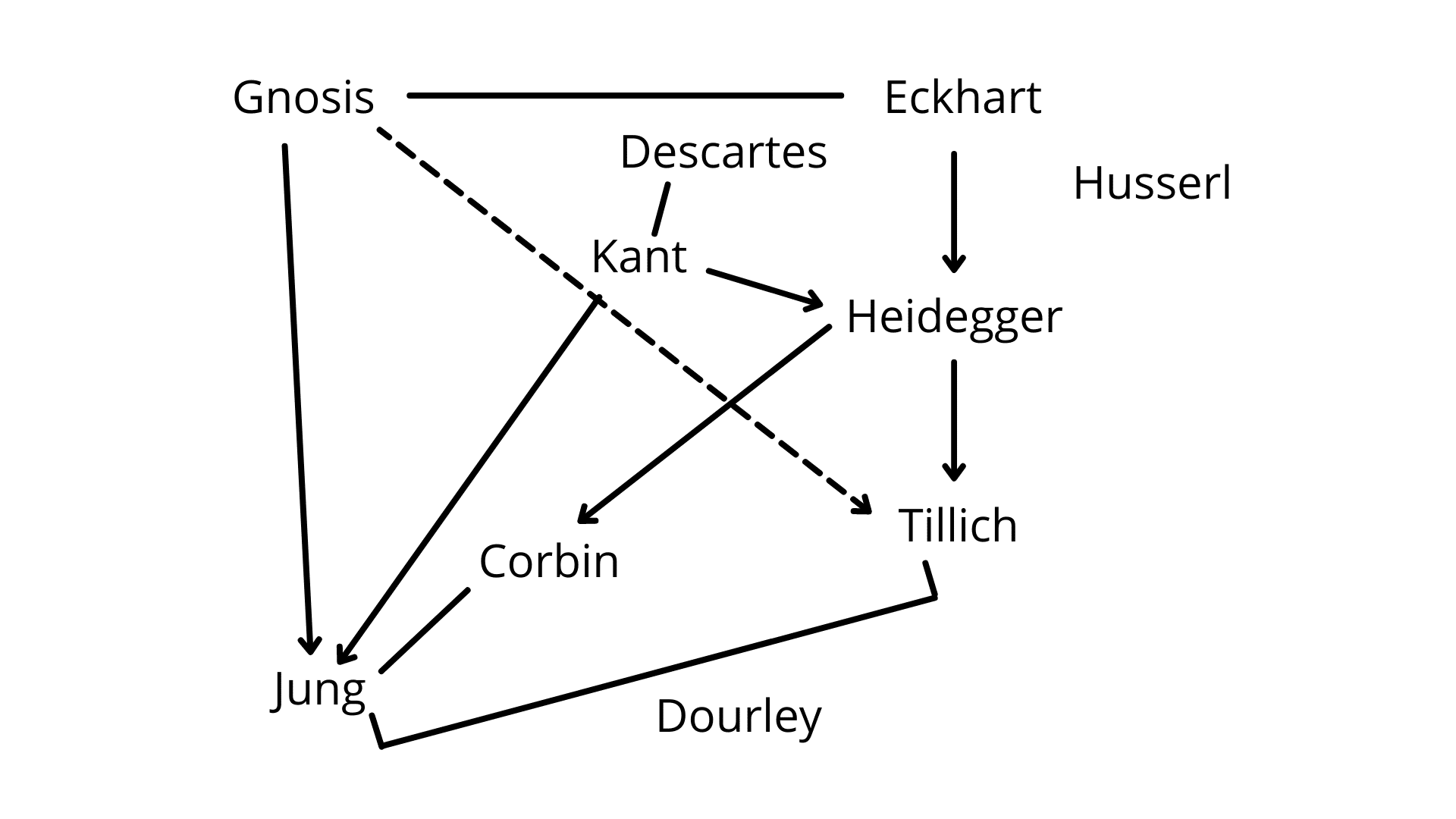
Fig. 3e
Now somebody that's also here directly influenced by Gnosis (Fig. 3f) (draws an arrow pointing away from Gnosis), influenced by Kant through the romantics (writes Romantics below Kant), which we've talked about, at least the early German romantics. People like, Schlegel, for example. And therefore, through Coleridge, right? And the person I'm drawing in here, this is going to be Barfield (draws a line from Romantics and writes Barfield). And you've heard me, mentioned him a couple times. And Barfield's notions of participation have a lot to say. So you can see how there's sort of a network here.
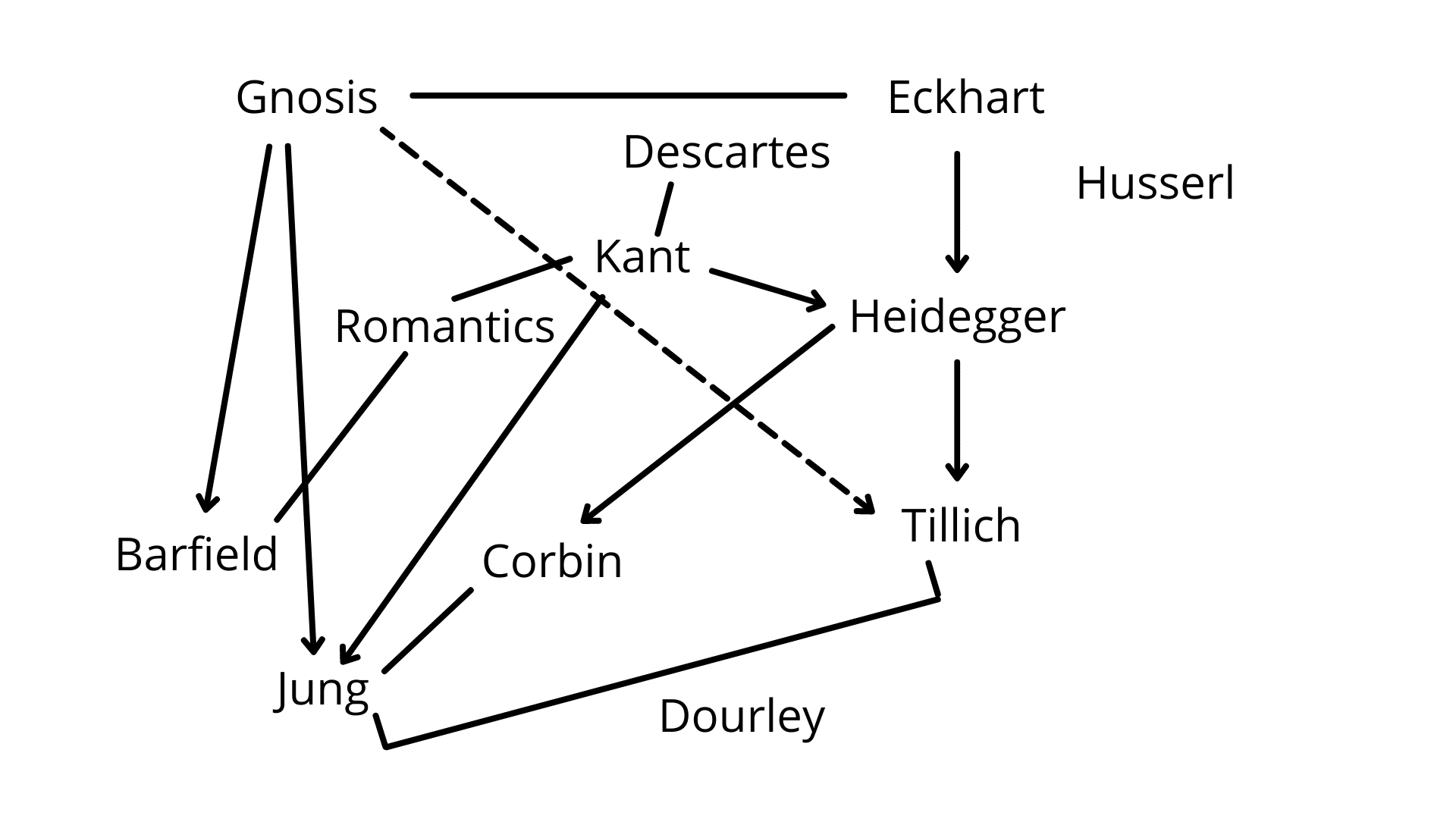
Fig. 3f
And then there's another one that, of course, we need to talk about. And this is the connection between Heidegger and what's been sort of a—I don't like this term, but, and people abuse it as postmodernism. As if everybody who's a postmodernist were saying the same thing. We should more carefully look at individual thinkers and their individual arguments.
One potential connection here is, we'll take a look at it, Derrida (Fig. 3g) (draws a line from Heidegger and writes Derrida). Now, whether or not we should call these, these two other people, postmodern is not clear. They are deeply responding to postmodernism and that's Graham Harman (writes draws an arrow from Heidegger and writes Harman) and the terrific work of Timothy Morton are also doing. And this is what's known as speculative realism (writes Speculative realism below Harman). It's also known—Harman's particular version of it is known as triple O (writes OOO below Speculative realism). This stands for object-oriented ontology. This is the attempt to deeply bring back a profound kind of realism and contact with reality. Another person that's influenced by [Heidegger] (draws a line from Heidegger) is Han (writes Han). Current philosopher and cultural critic.
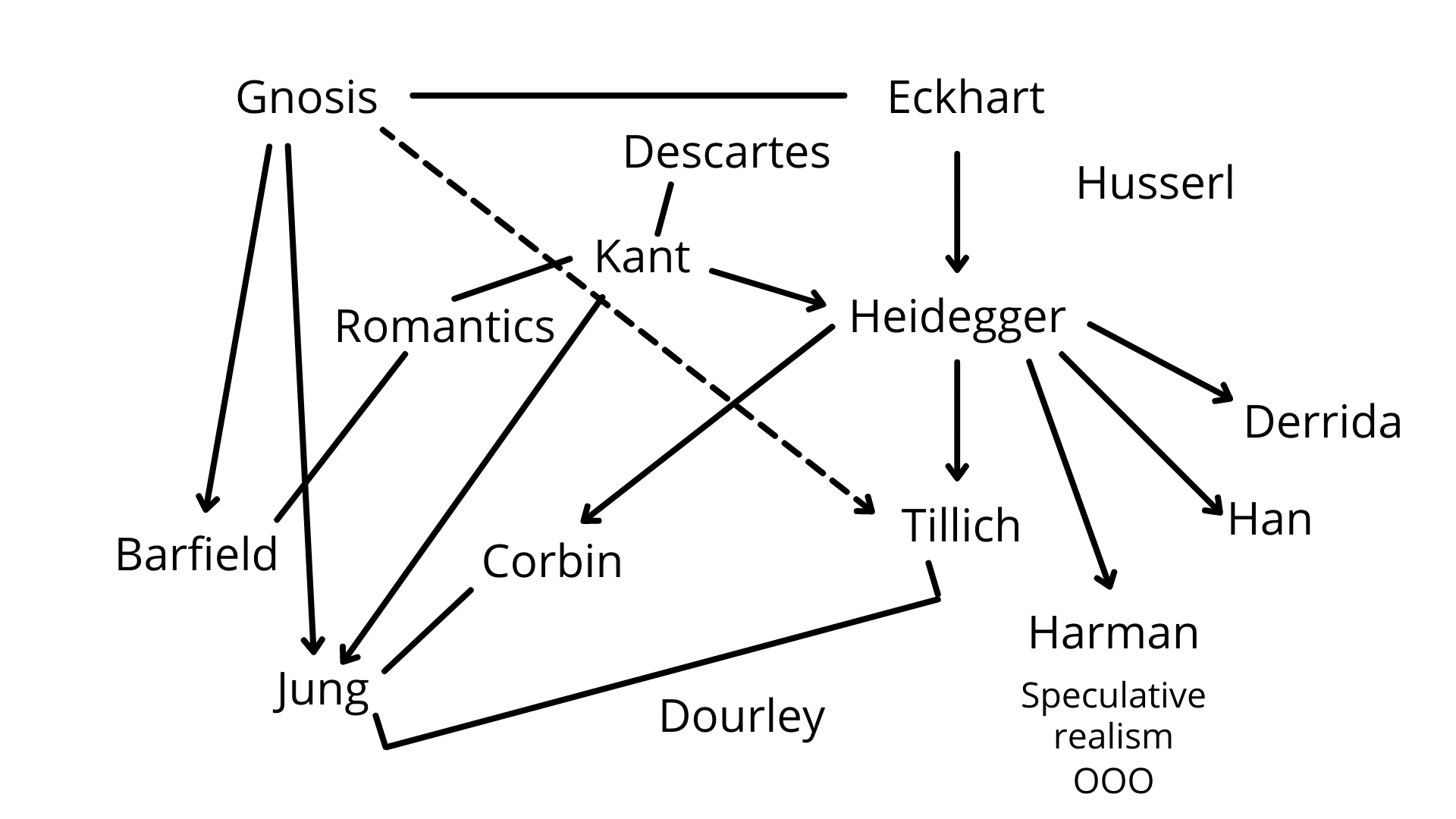
Fig. 3g
We'll talk a little bit about... I can't give all of these people equal work. I'm going to talk about Barfield, Jung, Corbin, and Tillich, and Heidegger quite extensively. Harmon, not as much. Han, not as much. Derrida, not as much, but I'll at least touch upon them. Okay. Because I want to do this as a way of trying to connect the meaning crisis to what's been called postmodernity broadly, very broadly construed. And offer an alternative response to postmodernism to both sort of wholesale adoption of it. Or the wholesale demonization of it. I think these are both overreactions that we should have a much more nuanced and careful response to.
Now Heidegger has a huge influence in an area many people don't know about (Fig. 3h) (draws an arrow away from Heidegger). And part of this influence is also James (writes James). And part of this influence is also Buddhism (writes Buddhism beside James). And you've heard me mention this, and this is the Kyoto school (writes Kyoto below James and Buddhism), and they are deeply about responding to the meaning crisis and especially the work of Nishida (writes Nishida below Kyoto) who really is the pivotal figure in founding this.
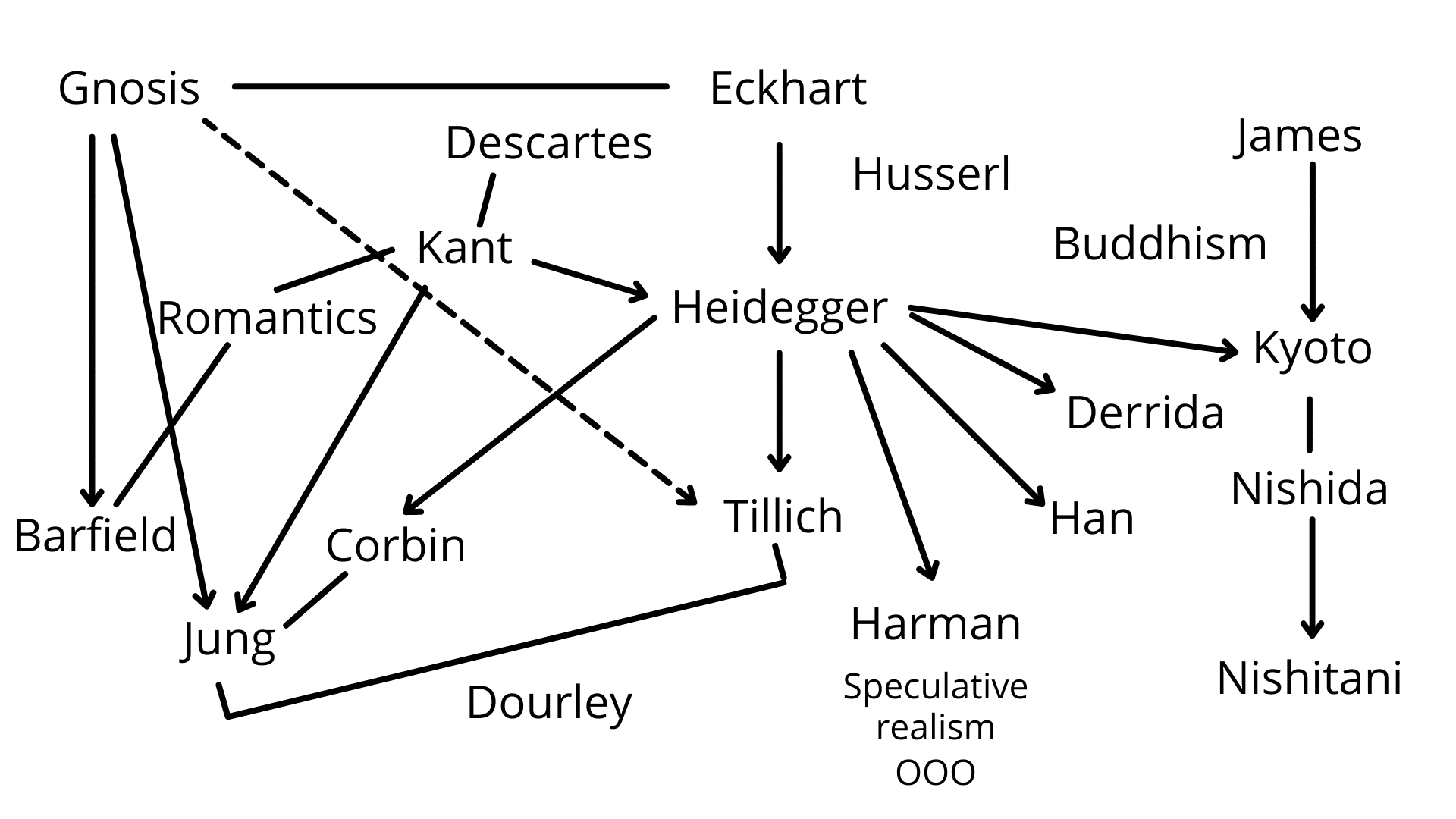
Fig. 3h
And then the person who I think wrote one of the masterpieces on responding to the meaning crisis. And this is Nishitani (writes Nishitani below Nishida). His book, Religion and Nothingness. I've read that book twice. I would put that book in the top five books of responding to the meaning crisis. It is not an easy book, but that's why I've not yet put it into like the Twitter book recommendations. I've recommended the Kyoto school and some of Robert Carter's excellent work, introducing you to these people. Directly reading Nishitani is very difficult. You need to know Heidegger well, James well, Buddhism well. And then the Kyoto school people, I won't talk about like Maso Abe. They put this into dialogue with people like Tillich and Whitehead.
So this is what I want to try and address. Again, I will be giving some of these people much more priority. I only have four lectures left after this, so four hours. So I'll be giving some people much more priority than others. Obviously, Heidegger is taking a central role here. But we'll be spending quite a bit of time with Barfield Jung, Corbin and Tillich, and with Nishitani. Okay. So those are the ones that I'm going to give priority to. These other people, I'll try to do my best to represent them, but I will have to prioritize. I want to keep my commitment to you that I finish this in the 50 episodes. I also do not want to drag my video crew to some kind of a video version of a death march until they are exhausted beyond all recognition.
So where to start on here? Well, I'm going to start at the center. So this is very complicated, and this is not meant to be an explanatory schema. This is meant to be a roadmap to show you where I'm going. How are things connected? You can take this down. And like I said, then you can use this to retrace the connections as I try to explicate and explain them (erases the board).
Husserl: Phenomenology
Alright. So before we get to Heidegger, we have to talk about, I don't have to talk about Eckhart and the Rhineland mystics, because I've already done that. Or gnosis cause I've already done that quite extensively. Or Kant because I've done that. But one person that I haven't discussed and by his titanic influence on Heidegger is Husserl. Edmund Husserl.
And Husserl (writes Husserl), of course, is famous for founding a whole philosophical movement called phenomenology (writes Phenomenology beside Husserl). Existentialism comes out of phenomenology via Heidegger, by the way, that's how you get existentialism. Heidegger does something to phenomenology and it leads to existentialism. But it also leads to deconstructionism postmodernism, blah, blah, blah, blah. I've already pointed out.
Now again, you need an entire course to get clear about what phenomenology is. I really recommend the introduction to phenomenology by Sokolowski (Fig. 4a) (writes Sokolowski beside Phenomenology). Sokolowski and the book experimental phenomenology by Don Ihde (writes Ihde below Sokolowski). This sort of gives you an idea of what phenomenology is. A very good, very clear i—and this gives you a sort of way of practicing some phenomenological techniques to get a more inside feel of what phenomenology is like.

Fig. 4a
Now phenomenology—and Husserl even writes a book where he invokes the word crisis—crisis in European sciences. Phenomenology was Husserl's attempt to try and I would argue the following thing. It's an attempt to try and get us back to a contact epistemology. And that's why you can see people who are deeply influenced by the phenomenological tradition, like Dreyfus and Taylor talking about the loss of a contact epistemology, because they're aware of the idea of a contact epistemology, I would argue, from their phenomenological heritage. Husserl famously argued about getting back to things, getting back to the things. That we had gotten so abstracted and removed, we had lost contact with the world. We were out of touch in a profound way, and that's why phenomenology has had such a big influence on those aspects of cognitive science that are trying to show how deeply embedded, embodied and connected we are to the world. So the attempt to get back at contact epistemology was really central.
And one way of understanding that contact (Fig. 4b) (writes Contact under Husserl), and to put it into dialogue with the language we've been using in this course, is that you get this contact by—see, phenomenology shouldn't be confused with merely introspecting. That's the everyday or common sense stance. The phenomenological attitude is not the same thing as your commonsensical everyday introspection. Instead, phenomenology is a much more disciplined practice in which you're trying to pay reflective and, following Ihde, a kind of an experimental attention, this probative attention to the way in which we are in contact with the world.

Fig. 4b
So let's say that what I'm doing in phenomenology is I'm playing (Fig. 4c) (draws an arrow from Phenomenology to Contact) this reflective, experimental, exploratory, probative attention (writes Reflective/ Experimental/ Exploratory/ Probative attention). Attention to contact. And then how can we understand contact? Well, what Husserl emphasized, he emphasized intentionality (writes Intentionality below Contact). That's one pole of this relation. Okay. Now I've got to explain this. Normally when we use this word, it's correct, but it's a species of the broader sense of intentionality—when you say you do something intentionally, it means you're doing it on purpose. Intentionality here in phenomenology and philosophy, in general, is much more broader. It means any mental directedness, any mental directedness. So when my perceptions are of the bottle or my actions are towards the book. Or I'm thinking about Paris. Those are all intentionality and that I have a mental directedness.

Fig. 4c
So there's the intentionality. And it's in this reciprocal relationship with the way in which a world is disclosed (Fig. 4d) (draws a double-headed arrow beside Intentionality and writes World disclosure), where world doesn't mean a planet. It means something that we've been talking about throughout. It means a meaningfully structured environment. A meaningfully structured environment, what I've tried to often capture by this notion of an arena. This (indicates Intentionality) is kind of a core kind of agency. This is at least mental agency, this mental directedness. So, and this is important. This is—Heidegger (text overlay appears saying, 'John means Husserl instead of Heidegger') used the word noesis (writes Noesis below Intentionality and draws a double-headed arrow beside it) here for this and the noema is here and there's of course, all kinds of debates about what does this refer to. Just something in my consciousness or something in the world.
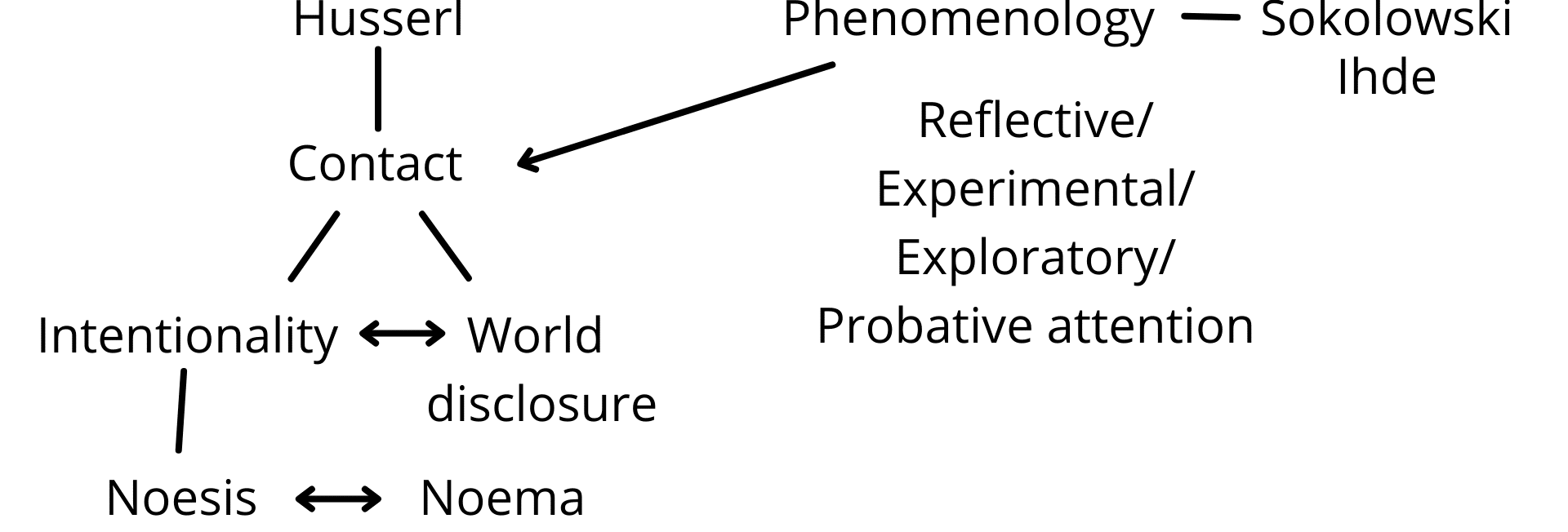
Fig. 4d
We're going to come back to some of this. We're going to come back to it when in order to get to Harman. And we are going to look at Sparrow's critique of phenomenology. Cause he's going to argue that the very goal of phenomenology, which was to get back into contact with reality and therefore to be a kind of realism, is thwarted by, this setup. So he's going to argue that phenomenology ultimately fails as a form of realism and that it's ultimately a kind of idealism and therefore it doesn't give us what it purported to do. We'll come back to that. That's just a forewarning.
What I would argue using this is what phenomenology [is] using—what I mean by this is the language and some of the conceptual vocabulary and theoretical grammar we've developed together—using that, I would describe phenomenology as this reflective, experimental, exploratory, [...] a probative attention on the transjective relationship. And the fact that he's invoking this term, remember noesis, right? This is perspectival knowing. So putting it together, it's this reflective—meaning all of these (indicates Reflective/ Experimental/ Exploratory/ Probative attention). It's this reflective attention paid to your perspectival knowing of the transjective relationship. And in that sense, it's deeply consonant with, and that's no coincidence this has had a huge influence on me and my thinking and many of the people in third-generation cog sci, 4E cognitive science have been deeply influenced by this because they're trying to understand meaning in this transjective way, making sense.
Heidegger: Criticism Of Husserl
Now, as I said, we're going to come back to criticize that, but right now—in order to make the bridge to Harman. But what I want to do now—and to speculative realism. What I want to do now is what did Heidegger do with this? (indicates Fig. 4d) What did Heidegger do with this?
Well, one way of putting this, that I think draws together, two of his criticisms is to... Well, no, no, maybe a better way. Let's do the two criticisms then draw them together.
One of Heidegger's main criticism is that Husserl's work, and this is going to be developed by Sparrow and the speculative realists, is that Husserl's work had not really given us contact. Now one way I would put it is because it had not really developed an account of participatory knowing. It had not really developed an account of how the agent and the arena were fundamentally related together so that this perspectival relationship could unfold.
Now, I don't think that's the case for all of phenomenology. I would make the case that Meleau-Ponty's—and we talked about this. Merleau-Ponty's ideas about embodiment and embeddedness are trying to get at the connection between the perspectival knowing of Husserlian phenomenology and the participatory knowing.
Nevertheless, what Heidegger was innovating, and this is how he was bringing in an existential aspect. He was trying to point out that the modal relationship between the agent and the arena, using our terms, was not properly accounted for within the Husserlian framework. So participatory knowing was deeply missing. And that's sort of our fundamental way in which we're connected, in contact with being.
And then in connection with that. That that participatory knowing had not been set within an ontology that this (indicates Intentionality, World Disclosure, Noesis, Noema) needed to be set within participatory knowing (Fig. 4e) (draws an arrow from Noesis and Noema and writes Participatory knowing). Existential modes. Existentialism comes out of Heidegger. And that in turn needed to be set into a proper ontology (writes Ontology beside Participatory knowing) and a proper account of the structure of being. To use our language. How does the transjective relationship sit within an overall account of the structure of being itself?
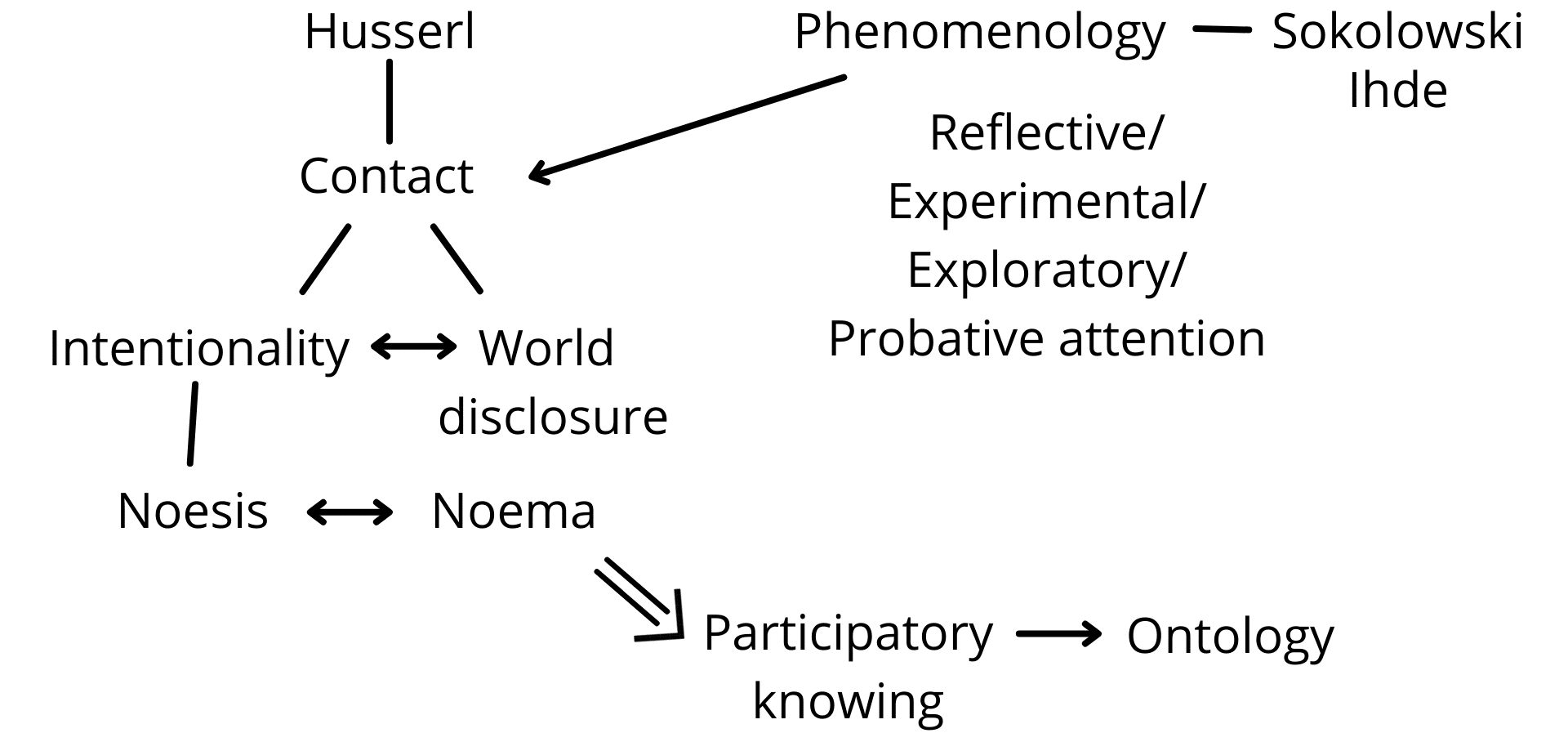
Fig. 4e
If we don't have that, then we don't have a con—we have not really got contact back. Cause we're still out of touch with our being and through our being of being itself. We're out of touch with our being and through our being of being itself. This is Heidegger's main criticism.
A related criticism that is pervasive—although for a long time implicit and I don't like the way Heidegger, of course, eventually turned on Husserl for despicable reasons. But one of the criticisms Heidegger was making is Husserl was still trapped within the Cartesian cultural cognitive grammar. Husserl is deeply Cartesian. He entitles one of his books, Cartesian Meditations. So in that sense, Heidegger feels that Husserl is still bound within the Cartesian grammar. And he sees that that Cartesian cultural cognitive grammar, for ways we've articulated, radically cuts us off from the world. And this is, of course, a way of saying that we're still sort of trapped within our subjectivity. And in that sense, we'll see what Sparrow means by Husserlian phenomenology is maybe still understandable as a kind of idealism, which doesn't get us back to realism as much as the phenomenologist claim and wanted it to do so.
So, how do we get to this deeper contact? In an organized fashion, how do we do those two things? How do we open up participatory knowing situated within an ontology and break free from the Cartesian, ultimately, he would say platonic—I think that's incorrect, maybe Aristotelian—but how do we escape the strictures, the restrictions of the Cartesian cultural cognitive grammar that keep us out of contact with reality?
So, what we need to do is phenomenologically, not just theoretically, but phenomenologically, within participatory knowing by transforming it in a reflective, experimental, exploratory, probatory way, our attention, right? By directing our attention to this fashion. I'm opening up our perspectival knowing. So we're going to phenomenologically realize, but we're going to direct that phenomenological realization towards something important. We're going to direct it towards our being. Who and what we are. That's how we're going to connect to the participatory knowing.
What's that going to do? Well, we're going to have a phenomenological realization, which, of course, is then going to become an existential realization. That we are the beings whose being is in question. We are the beings whose being is in question. Now, if you heard the word being and you think, well, you're a homosapiens and you've got DNA. That's not what's being meant here. Okay. That's not what's being met here. So be patient because it's what's grounding this (indicates Noesis and Noema) that is our being, I'm not talking about a biological phenomenon, at least in any direct sense. Although I think it's ultimately grounded biologically, right? We're talking about what grounds this Husserlian framework in a participatory knowing. What does it mean to say we are the being whose being is in question?
Well, you can even get a sense of this from the term existentialism. Remember we talked about this. That existentialism says human beings don't have an essence like other creatures, other things. So, you know, a gazelle is born. It is a gazelle. Its identity is set. It's going to develop into a gazelle. Right.
But for us, at least in so far, I would argue, as we are persons, our—who and what we are, whether or not it makes sense to call it our essence, because essence should be a widely shared property—but our being then—maybe that's a better word to use right now—who and what I am as the person, John Vervaeke, that has been in question. I existed before who and what I am has come into being. And in fact, it's still unclear to me who and what I am. And that's also the case, so you are in question. You exist before you have an essence before you have who and what you are. That's what existentialism (writes Existentialism) ultimately points to. That your existence precedes your essence. That's one of the things existentialism takes out of Heidegger.
But the key idea is that you are—this thing's being (lifts his water bottle) is not in question to it, or even ultimately to us. I mean, we can sort of do philosophy on it, but there's from within phenomenology, from within a phenomenological perspective—I'm sorry, phenomenological stance is perhaps a better word, we are in question to ourselves. Who am I? What am I? What is it to be a person? What kind of person am I?
You see why this is relevant? This question goes fundamentally, it's bound up with this question: what is the meaning of my life in this—not in the sense of destiny, but like, how is my life meaningful? What makes it meaningful? What makes it meaningful to me? What is its meaning?
Dasein
I notice—and we've already talked about Heidegger's connection to this. Heidegger is trying to get you into something like an aporia. And he's trying to get you to remember the being mode, the mode in which you're not trying to manipulate even yourself and solve problems. You're stepping back and confronting mystery because you're engaged, not with controlling things and satisfying you're having needs, you're engaged in a process of development of becoming. And so you're confronting mystery 'cause you're going through transformative experience. You are the being whose being is in question and he's trying to wake you up, not theoretically. Phenomenologically, he's getting you to phenomenologically realize that you are the being whose being is in question. That's what we all are.
So instead of referring to us as persons or human beings or things like that, he crashed this new word. Heidegger is famous for neologisms. And part of what he's trying to do with the neologisms is break us out of the familiar terms and thereby break us out of the Cartesian grammar. He comes up with this word Dasein (writes Dasein), which means being there. It has to do with, you know, I exist. Being there, being there I'm sort of flowing into the world, throwing into existence. And my being is in question. That dasein, being there.
So what's interesting is my participatory knowing, the way in which I try to connect to how I'm situated in being, has an aporetic element to it. Aporia, right? In which I realize that central to me, according to Heidegger, is that my being is in question.
Now if my being, that's my participatory knowing, my groundedness in being is in question, that is how I can link participatory knowing to ontology itself. Do you see? Because—and this is why it's participatory knowing—my self-knowledge will also get me into my knowledge of ontology because by knowing my self as the being whose being in question, I can put ontology itself into question. I can put, —sorry, no, not—sorry, I can frame an ontological question of putting being itself into question. I know my self as a being whose being is in question. And knowing my self that way is also to put being into question. Right? And so I got this deep participation in the code determining mysteries of who I am and what being is.
So by phenomenologically exploring that being, the being of dasein, we can simultaneously come into contact with our modal existence. We can remember the being mode. We can be opened up to the wonder of our own being that we are ultimately self-defining. At least in some important aspect, we're ultimately self-defining self-making things. But, of course, we don't do that egotistically or egocentrically because we're bound to the world for reasons I've already given you multiple times. So by phenomenologically exploring the being of dasein, we can simultaneously come into contact with our own modal existence in the mystery of being itself.
So this is starting to take us into the core of how Heidegger is trying to deepen what he thinks was missing. Ultimately the contact with ourselves, but not with our autobiographical ego, but with our being. The contact, our participatory knowing of ourself, the connectedness to being, and he's found this, I mean, it's, that's why he's Heidegger. There's brilliant insight that because we are the being whose being's in question, we can deepen the contact by phenomenologically exploring this (indicates Dasein). So that's really central to what Heidegger is trying to do.
Reading Heidegger is very hard because it's filled with all this neologisms. It's filled with all of this constant—qualifying this constant self-criticism, which, of course, is good. There's constant refinement, but also this constant acknowledgment statement that we're not quite getting it. We're not getting the answer. So it's like going on a walk through a really gnarled forest with somebody. This is a metaphor that Heidegger himself would use. And you get a sense of progress, but it's not clear if you're actually making progress. You come into clearings and you get openings and insight, but then there's also, but yet we haven't arrived. We haven't arrived until you go on again. And so there's this long process.
So what I want to do instead with you is, instead of trying to do something audacious to try and summarize—I want to try and go in and get some, I'm going to do some exposition with you. I want to read some key quotes from Heidegger and what I then want to do is try and unpack them, following this idea (indicates Fig. 4e) of how he's trying to deepen contact. Trying to put into dialogue with the very tremendous help of Dreyfus with the machinery, the theoretical machinery we have developed. And that will also afford me a critical response to Heidegger.
I'm not going to start those quotes now because we're almost out of time. What I want to do is just foreshadow what Heidegger is going to argue. Heidegger is going to argue that the history of metaphysics, that whole philosophical history coming out of the axial revolution is actually the history of nihilism. This is why he is a prophet of the meaning crisis, that whole historical development, that framework, that cognitive, that cultural cognitive grammar that we've inherited from the actual revolution, that whole metaphysical framework has developed inexorably towards nihilism. It has driven us into the meaning crisis and, of course, that's already deeply resonant with the historical analysis that we pursued in the first half of this course.
So if we can understand that cultural cognitive grammar of metaphysics, that's a pejorative term for Heidegger, we can link it to this project of the phenomenological investigation of dasein and break free from that grammar. And deeply re-establish, and this is not just theoretically, this is phenomenologically, existentially our contact with being and that deep participatory knowing and remembering of being and the realization of being and how it's not a being, not a particular being and our status with respect to being, that's the response Heidegger is recommending to the meaning crisis. And next time, what I would like to do with you is explore what his thinking is by going through the quotes, unpack it more. What links it to the argument that the history of metaphysics is the history of nihilism. See what we can glean in a cooperative dialogue between this course and Heidegger about responding to the meaning crisis and draw what important or at least relevant conclusions we can from that.
Thank you very much for your time and attention.
- END -
Episode 46 Notes:
To keep this site running, we are an Amazon Associate where we earn from qualifying purchases
Ludwig Wittgenstein
Ludwig Josef Johann Wittgenstein was an Austrian-British philosopher who worked primarily in logic, the philosophy of mathematics, the philosophy of mind, and the philosophy of language.
Alfred North Whitehead
Alfred North Whitehead OM FRS FBA was an English mathematician and philosopher. He is best known as the defining figure of the philosophical school known as process philosophy, which today has found application to a wide variety of disciplines, including ecology, theology, education, physics, biology, economics, and psychology, among other areas.
Process theology
Process theology is a type of theology developed from Alfred North Whitehead's process philosophy, most notably by Charles Hartshorne, John B. Cobb and Eugene H. Peters.
Heidegger
Martin Heidegger was a German philosopher who is widely regarded as one of the most important philosophers of the 20th century. He is best known for contributions to phenomenology, hermeneutics, and existentialism.
Edmund Husserl
Edmund Gustav Albrecht Husserl was a German philosopher of Jewish origin, who established the school of phenomenology.
Book Mentioned: The Crisis of European Sciences and Transcendental Phenomenology – Buy Here
Book Mentioned: Cartesian Meditations – Buy Here
John Caputo
John David Caputo is an American philosopher who is the Thomas J. Watson Professor of Religion Emeritus at Syracuse University and the David R. Cook Professor of Philosophy Emeritus at Villanova University. Caputo is a major figure associated with postmodern Christianity and continental philosophy of religion, as well as the founder of the theological movement known as weak theology.
Book Mentioned: The Mystical Element in Heidegger’s Thought – Buy Here
Meister Eckhart
Eckhart von Hochheim OP, commonly known as Meister Eckhart or Eckehart, was a German theologian, philosopher and mystic, born near Gotha in the Landgraviate of Thuringia (now central Germany) in the Holy Roman Empire.
Immanuel Kant
Immanuel Kant was a German philosopher and one of the central Enlightenment thinkers.
Paul Tillich
Paul Johannes Tillich was a German-American Christian existentialist philosopher and Lutheran Protestant theologian who is widely regarded as one of the most influential theologians of the twentieth century.
Book Mentioned: The Courage To Be – Buy Here
Henry Corbin
Henry Corbin was a philosopher, theologian, Iranologist and professor of Islamic Studies at the École pratique des hautes études in Paris, France.
Book Mentioned: The World Turned Inside Out – Buy Here
Book Mentioned: Imaginal Love – Buy Here
Book Mentioned: All The World An Icon – Buy Here
John Dourley
John P. Dourley was a Jungians analyst, a professor of religious studies, and a Catholic priest. He taught for many years at Carleton University in Ottawa, his doctorate being from Fordham University.
Book Mentioned: The Psyche as Sacrament – Buy Here
Book Mentioned: Paul Tillich, Carl Jung and the Recovery of Religion – Buy Here
Nontheism
Nontheism or non-theism is a range of both religious and nonreligious attitudes characterized by the absence of espoused belief in a God or gods.
Samuel Taylor Coleridge
Samuel Taylor Coleridge was an English poet, literary critic, philosopher and theologian who, with his friend William Wordsworth, was a founder of the Romantic Movement in England and a member of the Lake Poets.
Romantics
Romanticism (also known as the Romantic era) was an artistic, literary, musical, and intellectual movement that originated in Europe towards the end of the 18th century, and in most areas was at its peak in the approximate period from 1800 to 1850. Romanticism was characterized by its emphasis on emotion and individualism as well as glorification of all the past and nature, preferring the medieval rather than the classical. It was partly a reaction to the Industrial Revolution, the aristocratic social and political norms of the Age of Enlightenment, and the scientific rationalization of nature—all components of modernity.
Owen Barfield
Arthur Owen Barfield was a British philosopher, author, poet, critic, and member of the Inklings.
Jacques Derrida
Jacques Derriad, born in Algeria, was a French philosopher best known for developing a form of semiotic analysis known as deconstruction, which he analyzed in numerous texts, and developed in the context of phenomenology.
Graham Harman
Graham Harman (born May 9, 1968) is an American philosopher. He is Distinguished Professor of Philosophy at the Southern California Institute of Architecture in Los Angeles.
Book Mentioned: Object-Oriented Ontology: A New Theory Of Everything – Buy Here
Timothy Morton
Timothy Bloxam Morton is a professor and Rita Shea Guffey Chair in English at Rice University.
Speculative realism
Speculative realism is a movement in contemporary Continental-inspired philosophy (also known as post-Continental philosophy) that defines itself loosely in its stance of metaphysical realism against its interpretation of the dominant forms of post-Kantian philosophy (or what it terms "correlationism").
Byung-Chul Han
Byung-Chul Han is a South Korean-born Swiss-German philosopher and cultural theorist.
Book Mentioned: The Scent Of Time – Buy Here
Robert E. Carter
Book Mentioned: The Kyoto School: An Introduction – Buy Here
Book Mentioned: The Nothingness Beyond God: An Introduction To The Philosophy Of Nishida Kitaro – Buy Here
Kitaro Nishida
Kitarō Nishida was a prominent Japanese philosopher, founder of what has been called the Kyoto School of philosophy.
Keiji Nishitani
Keiji Nishitani was a Japanese university professor, scholar, and Kyoto School philosopher. He was a disciple of Kitarō Nishida.
Book Mentioned: Religion and Nothingness – Buy Here
Phenomenology
Phenomenology is the philosophical study of the structures of experience and consciousness.
Robert Sokolowski
Monsignor Robert Sokolowski is a philosopher and Roman Catholic priest who serves as the Elizabeth Breckenridge Caldwell Professor of Philosophy at The Catholic University of America.
Book Mentioned: Introduction to Phenomenology – Buy Here
Don Ihde
Don Ihde is an American philosopher of science and technology.
Book Mentioned: Experimental Phenomenology – Buy Here
Hubert Dreyfus
Hubert Lederer Dreyfus was an American philosopher and professor of philosophy at the University of California, Berkeley.
Charles Taylor
Charles Margrave Taylor CC GOQ FRSC FBA is a Canadian philosopher from Montreal, Quebec, and professor emeritus at McGill University best known for his contributions to political philosophy, the philosophy of social science, the history of philosophy, and intellectual history.
Book Mentioned: Retrieving Realism – Buy Here
Noesis
Nous, sometimes equated to intellect or intelligence, is a term from classical philosophy for the faculty of the human mind necessary for understanding what is true or real.
Noema
The word noema (plural: noemata) derives from the Greek word νόημα meaning "thought", or "what is thought about".
Maurice Merleau-Ponty
Maurice Jean Jacques Merleau-Ponty was a French phenomenological philosopher, strongly influenced by Edmund Husserl and Martin Heidegger.
Book Mentioned: Phenomenology of Perception – Buy Here
Speculative Realism
Speculative realism is a movement in contemporary Continental-inspired philosophy (also known as post-Continental philosophy) that defines itself loosely in its stance of metaphysical realism against its interpretation of the dominant forms of post-Kantian philosophy (or what it terms "correlationism").
Dasein
Dasein is a German word that means "being there" or "presence", and is often translated into English with the word "existence".
Aporia
In philosophy, an aporia is a conundrum or state of puzzlement.
Nihilism
Nihilism is a philosophy, or family of views within philosophy, expressing negation (i.e., denial of) towards general aspects of life that are widely accepted within humanity as objectively real, such as knowledge, existence, and the meaning of life.
Other helpful resources about this episode:
Notes on Bevry
Additional Notes on Bevry


